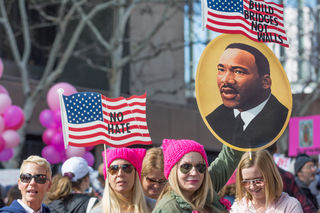
Mindfulness
Mindfulness and Activism
Attentiveness transforms the self and society.
Posted February 11, 2017
In the spirit of U.S Rep. John Lewis’ “good trouble” and feminist theorist Donna Haraway’s “staying with the trouble,” I offer this defense of activism or homage to activism in the time of Trump, or the age of American decline. I have lately been writing popular books on meditation, most recently, A Mindful Morning and A Mindful Evening, books intended to suffuse the mundane life of the reader with the glow of the transcendent. Some of you might be wondering what this work on mindfulness has to do with the political articles that I have written in this time of global tragedy. Xenophobia and nationalism rear their ugly heads in Europe and America, as though the world has collectively forgotten the horrors of the blood and soil movements of the twentieth century. The cruelty of the nation state in refusing the refugee (a betrayal of both the Hebrew prophets and their scion, Jesus of Nazareth, to say nothing of the United Nations Universal Declaration of Human Rights or the Geneva Conventions) should make us wonder whether the “civilized” nations of the world ever deserved the dignity of such a label. Indeed, “universal” liberty has always only applied to a few, has always been a politics of exclusion, a lopsided “welcome table.” Citizenship comes with the implicit threat of its revocation (prisons, courts martial, routine violence) in the carrot and stick structure of the state.
Mindfulness requires noticing—not in the detached, third person perspective of a remote observer (an epistemological fiction), but in the sense of caring for others, animal, vegetable, and mineral, even at one’s own expense. Max Scheler, one of my philosophical inspirations, said that, to put it briefly, to know is to love. One cannot know another person, or even what we call material reality, without loving. To be mindful requires attention, investment, and care. Love need not be sentimental or even emotional, really--love can be a gritty sort of refusal to let the lie slide. Though he made mistakes and the horrors of the partition hang over his legacy, Mahatma (insisting on this well-deserved honorific) Gandhi—a great inspiration for change in America—understood that the struggle, the trouble, also liberates the oppressor from having to hold to untruth. He understood the structure of the thesis-antithesis-synthesis dialectic (often attributed to Hegel but perhaps closer to Fichte), expressed in social change movements as satyagraha, or holding to truth.
Mindful activism means shining a light on unjust systems and putting ourselves on the line in order to transform society on behalf of others (making “kin,” in Haraway’s thought). It should also be said that no activist ever works from a place of pure innocence: in this system of global capital, built on centuries of exploitation, no one stands on solid ground, least of all the white, male educated elites like myself. But to speak from a place of privilege, to risk hypocrisy and ridicule, is better by leaps and bounds than to hold silent, to ignore the suffering on display everywhere “for those with eyes to see and ears to hear.” Even ink-stained scribblers like myself, who speak from a place of relative safety, understand that safety is always relative—that as long as some people in our society feel threatened, no one can ever really be free from the fear of the gulag, the American expression of which is the apartheid archipelago of industrial prisons. A society that targets activists and journalists cannot be far from a Stalinist-style nightmare. I do not mean this as hyperbole or shock tactic—the ripples of purposely-induced fear already shudder through this so-called “homeland” (again: blood and soil). To pay attention to the fear defuses the fear.

In order to increase the relative safety, mindful activists must purge the discourse of imaginary enemies and concentrate on the very real threats to a democratic and open society. I understand perfectly well that American history has never really been democratic, but in the germ of the ideal lies the possibility for growth. When millions of people unite together mindfully, deliberately sharing a common lot, transformation cannot be far behind. Of course, change can only be temporary, dwelling in the interstices and intersections of movements for change--red, green, black, and pink. When socialists get together with Native Americans, who get together with environmentalists and feminists, who get together with African-Americans and anarchists, amazing things can happen. In this kin-making power of connection lies hope, and I know that word sounds tired now. But hope has always been tired, and hope always keeps working. So, whether you work from the streets or behind a computer screen, take the blessings of attentiveness and caring. The world desperately needs us all to pay attention.
I know that mindfulness has been saddled with a corporatist label, as just another technique for increasing productivity, but it need not be so. Mindfulness has the potential to transform the entire society, when enough people pay attention and are willing to take chances on behalf of beloved ones. So we must, first of all, notice, and then take action, putting our careers, our reputations, and, (only rarely and never out of a sense of martyrdom) our lives on the line. Risk need not be absolute or existential in nature, but some risk will be involved in making a more just society. We all owe the good things that we enjoy to those who struggled before us, and we owe it to our children and grandchildren to work for a better world. We do not have to heroic, except in the routine sense of doing the right thing. The present seems dark, but the light, what is known in Hinduism as the Satya Yuga, or Age of Truth, dawns as soon as ordinary people, unfazed by the forces arrayed against them, work to countermand the Great Ego that devours the world. We fight the inner battle against resignation so that we might fight the outer battle against cruelty. This inner and outer struggle begins now, always now, insisting on the now, and continues as long as necessary.
References
Dillard-Wright, David. (2016). A Mindful Morning: Start Each Day with a Clear Mind and Open Heart. Adams Media.
---. (2016) "The Cult of Trump: The Trump Family Has Become to America What the Kim Family is to North Korea." Alternet.org. http://www.alternet.org/election-2016/cult-trump
---. (2016). "Unraveling the Cult of Trump: American People Must Once Again Take Power Into their Own Hands." Salon.com / Alternet.org. http://www.salon.com/2016/12/26/unraveling-the-cult-of-trump-american-people-must-once-again-take-power-into-their-own-hands_partner/
---. (Yule 2016-2017). "Occupy Interstate: A Strategy Proposal." Earth First! Journal.
---. (2017). A Mindful Evening: Complete Each Day with a Calm Mind and Open Heart. Adams Media.
Fichte, J.G. (2003). Science of Knowledge. Trans. P. Heath and J. Lachs. Cambridge: Cambridge University Press. 200ff.
Haraway, D. (2015). Staying with the Trouble: Making Kin in the Chthulucene. Durham: Duke University Press.
Hajari, Nisid. Midnight's Furies: The Deadly Legacy of India's Partition. New York: Mariner, 2015
Lewis, John. (1998). Walking with the Wind: A Memoir of the Movement. New York: Simon and Schuster.

